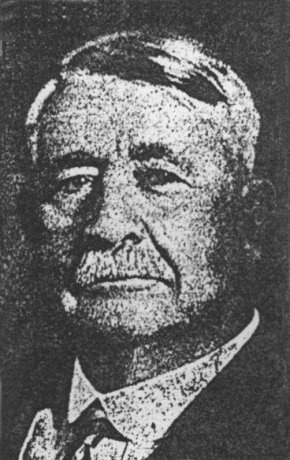
Cash M. Cade
Shawnee, Okla., Feb. 16, 1921. Mr. H. V. Butcher,
Editor Western Star,
Coldwater, Kansas.Dear Sir:
I received your four papers and the other night while my wife was at church I pursued the whole bunch. In looking over the days of twenty-five, thirty and thirty-six years ago and especially the thirty and thirty-six years a great many names, dear good friends of mine showed up. I sure appreciate your sending these papers to me.
You asked me to give you a little history of Coldwater, and I believe I will do so.
In Harper, Kans., in the spring of 1884 there assembled in the office of Sam S. Sisson, now deceased, George Vickers, now deceased, Tim Shields, now deceased, J. Paul Grove and myself. Mr. Grove lives in Alva, Okla. It was decided to go through on the Kansas line by Kiowa to a centrally located point east and west of Comanche-co., where we would get a corner and survey north and locate a town near the center of Comanche-co.
In that party that started out to locate the town site was Sam Sisson, Tim Shields, George W. Vickers and myself. We had a little grub, a shotgun to kill game, the necessary medicine for snake bites, and a surveyor's outfit, Mr. Vickers being a civil engineer. When we got to Kiowa, we went through Nescatunga, a new town started by some people from Medicine Lodge, aiming to make it the county seat of Comanche-co. The cattlemen and the cattle that had been grazing in Comanche-co. had destroyed all the government surveyors' marks except a few township lines which we could find now and then.
So we went south to the state line between the Cherokee Strip and the Kansas line in the Indian Territory, Vickers being the surveyor and the rest of us the chain carriers and flag men. So we started to survey north. The chain carriers after they had worked half a day and had taken lunch and gone back to work came to the conclusion that there was great danger of rattle snakes, so they decided they would take a little of the snake medicine which they had with them and then it was stick, stuck until they had to change pins, and when they did that, of course they would take a little medicine for snake bites. So about three o'clock in the afternoon the chain carriers got tired and when they woke up one of the fellows said to the other, "How many chains?" He said "forty-eight." The other said it was "fifty-eight, or something of the kind, so they split the difference and when they came to the center of what they supposed to be Comanche-co., they had missed it a mile and a half. They went east then and heard of a township corner and stayed all night and surveyed from that corner to the present town site. On a piece of school land where we found this town site corner was C. C. Tincher who was a member of the Nescatunga Townsite Company, but after he took a meal with us and partook of the necessary snake medicine, he immediately abandoned his comrades at Nescatunga and joined our town site company, I paying his way in. We surveyed over Coldwater and found just below us on Calvary Creek where we had to camp for water Mr. C. D. Bickford who was also figuring on a town site. He was from Coldwater, Michigan and told us that if we would let him name the town, he would give up his town site project. That is the way the town was named Coldwater.
We left all the land around Coldwater for the settlers. We took a section for the town site. There were fifteen members of the town site company. We did not expect to have over five. The amount we paid in was $4,500.00. We declared a dividend to the amount of $150,000.00. After declaring one dividend we had $700.00 left in the treasury. We made a motion to give the citizens of Coldwater a banquet. If there are any old timers left in Comanche-co. they will remember that banquet because they were all of them there and it lasted for three days. It was an old fashioned western banquet, plenty to eat and drink and everybody made merry.
We started to make Comanche-co. a cattle county like Barber, but J. D. F. Jennings and others arrived near Coldwater about this time and the first election we had was a herd law and anti-herd law ticket. Jennings won, of course - he was the farmer, the downtrodden farmer. He was in favor of letting the people rule and putting the plutocrats out of business. After that we organized as republicans and democrats. I had the privilege of being acting mayor and mayor, and one time Henry Story was my marshall. He now resides at Elk City, Okla.
One time, Henry Story went on Mule Creek to arrest a man for some misconduct and the fellow resisted, having a shotgun in his hand, so Henry took a shot at him and he fell over and Henry thought he had killed him. They threw him into the buckboard and started for Coldwater. When they were close to the city limits they heard a noise and looked back and the fellow had jumped out of the wagon and was making his escape. The bullet had hit a spool of thread which he had in his vest pocket and the shock and scare knocked him over, so Henry felt relieved and so did the people generally.
We had an orderly city, no killing. It was wild and woolly, but it was wild in the way of feeling good and having a good time. It seemed that even the babies had money in those days, although we never raise anything except one year, during the early settlement. We mortgaged our farms and generally paid one year's interest to show good faith and then let the washerwoman back east have the farm.
This part of the history would not be complete without finishing it with telling the story of R. C. Palmer, whom all of the old timers remember as probably the most unselfish man as well as the best lawyer in Coldwater. At a political meeting in Coldwater in 1885 R. C. Palmer came in town from Glick-tp. as a delegate, riding a gray pony with a saddle about as big as man's two hands. He had on an olive drab suit of clothes and as the old timers will remember, he was the ugliest man in that part of Kansas or any place else.
At this convention, J. D. F. Jennings was the chairman and Glick-tp. asked for recognition for at least two hours, but Glick-tp. was not on the state so they could not be recognized. Finally the delegation from Glick-tp. picked Bob Palmer up bodily on their shoulders and came down to the rostrum and notified the chairman that he would be recognized. Indeed, he was recognized and he made an old fashioned Kentucky Democrat speech - it was a gem, it was high class. I was an onlooker and after the speech the applause was such that they broke the floor in. But what I was going to say was that after the meeting I invited Mr. Palmer to come up to my office and asked him why he did not open an office and practice law. He said he was broke was the only reason, and then his health was not the best. I offered to furnish him sleeping apartments and an office. He accepted the offer and he never left me from that day until he died in Kingfisher, Okla., on the 23d of July, 1893.
He was the greatest man that I have ever met in all my travels. He was as near like Christ, as the Bible describes Christ, as to unselfishness. He never had a selfish thought. He was always for someone else. He died like a hero and asked me to put not a bouquet, but one flower, on his grave on Decoration Day as that was his birthday. I have faithfully performed that service since 1893 and have only failed one time and then I was in France and another old westerner by the name of W. F. Doorley who now lives in Kingfisher and who has always accompanied me on each occasion, did it for me in 1913 when I was in France.
My boy, C. M. Cade jr., who now lives in Dale, Okla., was the first child born in Coldwater. He was born just one block west of the First National Bank building on the second lot from the corner across from the old Sombart Drug store. He has two children alive and one dead. Mrs. Chapman took care of him after my wife's death when I took my wife to Anthony, Kans., where she was buried. I came back and took the child to my grandmother, Mrs. Kitchens, who lived in Anthony, Kans.
Ned Sisson died in Oklahoma City, Ben Eaton in Wichita, Tim Shields in Enid, Geo. W. Vickers in Alva, Lockwood in Missouri, Geo. M. Norris in St. Joe, Mo. Just a few of the old timers are left. They stand like old stumps of trees. A. K. Cook, attorney with Ned Sisson in the early days, now lives at St. Petersburg, Florida, practicing law. Frank Myer, who always used to hold office, now lives at El Reno as also does C. O. Blake, Blake is at the head of the law department of C. R. I. & P. Railroad. Ernest Blake is on Oklahoma City, a leading attorney. Judge Widaman lives in Anadarko. Shang Ward is now in Wichita. Ed Ward is at Stigler, Okla.
Doc Halliday is in Muskogee. I have kept track of a great many of the old timers. There never was a town in the United States that had as many good fellows in it as there were in Coldwater. I saw Cannon Ball Green last year. He now lives at 315 Queen Avenue, Long Beach, California.I cannot write a little history of this kind like I should because I like to amuse the readers at the same time giving actual facts.
I stopped in your city five years ago. I stayed all night at Dick Rich's - that is my wife did. Parker Wright was sick that night , and about five of us old timers including Billy Kimple, sat up with him until two o'clock in the morning. I left there at four o'clock in the morning and drove to Enid. Did not have much sleep that night, but I was younger then. When I read your thirty-six years ago items, it just makes me thirty-six years younger. We have seen a great many things happen. I have traveled a good deal since then. I have been around the world, but there is no place that I have ever lived where I have met as many good fellows as I met in Comanche-co. It was the most unselfish bunch of fellows that ever got together and a comradeship was formed in those days that we will never forget. We should have a reunion sometime at Coldwater.
Give my kind regards to all the old timers, especially D. T. McIntire, P. H. Thornton, Parker Wright, Dick Rich, Louis Rich and any others that you see that I may not have mentioned.
This is just off-hand talk, but I hope it will interest a few of your readers.
Sincerely,
C. M. CADE.
The Western Star, March 17, 1922. MEMORIES OF EARLY DAYS.
A few Reminiscences of Pioneer Life in Comanche-co.Every early day settler in this county will doubtless remember Cash M. Cade, who, as secretary for several years of the Coldwater Town Company, and as an active business promoter, had much to do in shaping the early history of Coldwater. Mr. Cade was lured to Oklahoma back in the early 90s (1890's), and he has since been a prominent figure in the development of that state. For several years he has been a resident of Shawnee, being a prosperous banker of that city. The Western Star is in receipt of the following interesting letter from Mr. Cade, in which he recounts some of the memories of early day life in Coldwater and Comanche-co.
Early Days in Coldwater. In the early days of Coldwater, politics cut no "ice." The Coldwater Town Company was for a cattle country, like Barber.
J. D. F. Jennings appeared upon the scene and located at Reeder north of Coldwater, and after he looked the situation over, figuring on getting an office, he at once took up the fight of two room house "Peepul" and organized a herd law ticket and was nominated and elected Probate Judge.
I opened the first land office and made filings and proofs for the settlers. My boy, C. M. Cade was the first child born in Coldwater.
Pat Gallagher laid out the first road from Mule Creek to Coldwater, going north of Nescatunga. Mr. Gallagher, a good old Irish soul, took a mowing machine and cut a "swath" of grass, put up a sign at Mule Creek which read, "The best and eight mile shortest road to Coldwater." Pat was one of the first among the old timers to solve the mystery of death.
Captain Pepperd had a fine ranch and house on Mule Creek. He was offered at one time $125,000.00 for it, and left the county poor. He became a friend of the Coldwater Town Company on account of our being for free range.
When we organized Comanche-co. we selected the Captain to be census taker. The census taker was IT when it came to locating a temporary county seat. He was a friend of the then Governor Geo. W. Glick. A Watson, who lived at Belvidere was against Coldwater and for Nescatunga. Mr. Watson made the charge that Captain Pepperd could not read or write and therefore, was not a fit man to take the census. Pepperd withdrew and recommended Tom Taylor, and he was appointed. No one was "overlooked" that favored Coldwater, so we won.
Tim Shields was elected the first mayor and the town site was proved up under the Act of Congress permitting mayors to make proof. We had some opposition and that opposition grew. For instances, we located a block in the west part of town for the court house. D. C. Kelly, Al Merryman and Parker Wright that the present site was better so our Company, which was losing power, compromised and agreed to the present location. Our company started out with a close corporation of five men - Geo. W. Vickers, Sam Sisson of Harper, Kansas, J. Paul Grove of Anthony, Kansas, Tim Shields of Albion, Kansas and myself, but it was increased to fifteen. Of the five original town site company only two are alive, J. Paul Grove of Alva, Okla., and myself. Riley Lake and Rube Lake of Lake City, gave us our first stage coach line from Medicine Lodge and "Keno" was the best driver that ever held "ribbons" over six mules. He drove a rockaway stage, now extinct.
We had lots of fun in the early days. Chas. Chapman, the son of Squire Chapman, was full of practical jokes. He played one on me. We went to the Chinese laundry to get our laundry. He knew more about China men than I did. While there he said to me, "Cade, put some cold water in the pot that the Chink is cooking rice in." I followed the advice of Chapman and the Chink hit me with an iron dipper knocking me down.
We had mock trials. When a "dude" struck town, he was arrested for some offense. J. D. F. Jennings and A. K. Cook would defend and Geo. W. Vickers and Bob Palmer prosecute. A trial was in progress in Justice of Peace court trying a stranger for horse stealing, as he had just arrived in town. He was found guilty and J. P. was about to pass sentence fixing the date when he should be hung when a young lawyer looking for a location interned and stated to the Squire that it was not an offense for which the penalty of death could be attached, when some one in the audience hollowed, "Hang him, Hang him." Some cowpuncher threw a lariat rope and in place of catching the prisoner caught the young lawyer. While they we were going downstairs, the lawyer kept protesting that they had the wrong man. He got the rope loose and walked or ran to Kinsley, Kansas.
We all borrowed money when we "proved up" paying 12 percent interest and 12 percent commission. It seemed like the babies had money. The rule was to pay the first coupon to show good faith, then quit.
I had the saddest time of life in Coldwater, and the happiest.
The old Coldwater crowd all did well In Oklahoma, but the ones who stayed in Comanche-co. did better. Any way, they, the pioneers of Comanche-co., were God's noble men and women.
This article is already too long and must stop. To the old-timers of Comanche-co., I want to say, God bless you, and good luck.
C. M. CADE.

Cash M. Cade
Prominent, among the men who helped to lay out the city of Coldwater and to start the town on its nearly 42 years of growth is Cash M. Cade, who has been a resident of Oklahoma for 36 years but who still has a keen interest in the people of Coldwater and of Comanche-co. As a member of the original Coldwater Town Company, as the town's first mayor and as one of the principal boosters for the town during the first five years of its existence, Mr. Cade came in contact with a large number of the early day settlers of the town and county. In all that he did he made a splendid record as a careful, conservative and far sighted businessman. He was a pioneer, not only here, but in other parts of the Great West as well. He had a degree of pride in adventure and in conquering the plains, helping to convert them into prosperous farms, and in building substantial cities where once extensive herds of cattle roamed.Among the small bunch of men, nearly all from Harper-co. who in the spring of 1881 conceived the idea of moving out 90 miles westward to the unorganized county of Comanche and starting a new county seat town. Cash Cade was perhaps the leading spirit. Besides Mr. Cade, that bunch of men was composed of Tim Shields, Dan Cline, S. S. Sisson, Geo. W. Vickers, H. S. Bennett, Capt. Thos. Doak, J. Paul Grove and a few others. It was a band of intrepid, hopeful and ambitious men who saw an opportunity to establish here a new and promising town They realized their dreams remarkably well, as practically all of them stayed with the new town, at least until it was well established.
To C. D. Bickford, who had formerly lived in Coldwater, Mich., is due the credit of naming and first locating the city of Coldwater. He settled about three miles southwest of the present city limits and had started the town there with a few tents and small buildings. But when the Harper-co. town boosters arrived on the scene after bargaining with Mr. Bickford, the location of the new town site was changed. The present location was considered preferable, principally because of its being on higher ground.
Competent surveyors were secured and it was not long until the new town site was carefully plotted very much the same as it is today, with the exception that two or three additions were made to the town - Bale & Wiley's, Cade's, Miller, Jones', and Wright's addition being the principal ones.
The Town Company adopted a liberal policy, donating a lot free to all who would build, under certain conditions, and the town at once began to make a rapid growth. As stated, Mr. Cade took an active part in all of the young town's activities, especially in its municipal affairs and its material welfare. He was considered one of the town's leading citizens.
However, when the new country of Oklahoma, south of us, was opened for settlement in the year 1889, the lure of that country was too strong for Mr. Cade to resist. He, with a number of other Comanche-co. people, joined the throngs who rushed in to the new country. Most of them secured claims or town lots, or "a place to stay," as they put it, in some portion of the strip of country which was opened for settlement. Mr. Cade chose to locate in the new town of Kingfisher, and there he began again the work of helping to organize and to build a town.
It was on April 2, 1889, that Mr. Cade landed in Kingfisher. He helped lay out the new town and was president of the city council. It is said that the "Coldwater crowd" was practically in control in Kingfisher at that time.
Mr. Cade was the first mayor of the town, and was a member of the town site board. He was appointed to serve as the first county clerk of Kingfisher-co., the appointment having been made by Gov. Geo. W. Steele, Oklahoma's first governor. He took a prominent part in the political affairs of the new county and later, of the state. He served as chairman of the Republican state central committee from 1902 to 1904, and on 1908 he was elected national committeeman for Oklahoma, serving in that capacity for four years. After 1912 he retired somewhat from politics, "A wiser and a poorer man," he says.
From Kingfisher, Mr. Cade went to Shawnee in October, 1905, and there went to work for the O. C. & G. railway in the capacity of right of way and town site agent. Mr. Cade finally turned his attention to banking, and was actively engaged in that business for 25 years in Shawnee. He says that he found banking no easy snap. From 1920 to 1924, he says, bankers had more trouble to survive than did Kansas banks during the years 1893 and 1894.
During the year 1913, Mr. Cade and his second wife, accompanied by their son, Leo, made a trip around the world. It was a memorable trip, says Mr. Cade.
Mr. Cade was a native of Ohio, having been born in Noble-co., that state, on August 4, 1856. He received a common school education, secured a certificate and taught school for a few years. At one time he was a student in the famous Holbrook National Normal University, at Lebanon, Ohio.
In May, 1876, Mr. Cade turned his face westward and pioneered for a while in the Black Hills. In 1879 he came to Anthony, Kans., where he lived a while. He came to the new county of Comanche in 1884, as before stated.
Mr. Cade's son, Cash Cade Jr., was the first child born in the city of Coldwater. The town was started during the last week of June, 1884, and young Cade was born on September 28, following. The mother died 28 days afterward, and young Cash, not long afterward, was placed in the care of his grandmother in Anthony. Cash Jr. now lives on a farm near Dale, Okla. He spent a year or more as a cadet at the U. S. Naval Academy in Annapolis, Md., but did not like such a life, and returned home, settling in Oklahoma. He has been married for several years, and has two boys - one 17 years and the other 15 years of age. The elder son is Cash Cade III.
More Information on Cassius M. Cade SOME TOWN NAMES OF BRYAN COUNTY, OKLAHOMA: The community of Cade was named for Cassius M. Cade, who was a territoral political leader. It had a post office from 1903 to 1915.
The town of Cade, Roger Mills County, Oklahoma, which had a post office from July 6, 1899, to April 30, 1902, was named for Cassius M. Cade.
Distinguished Oklahomans Inducted into the Oklahoma Hall of Fame: 1939, Cassius M. Cade - Shawnee, Congressman.
Cassius M. "Cash" Cade was the 1st provisional Mayor and City Clerk of Kingfisher, Kingfisher County, Oklahoma territory. -- Lawmen & Outlaws of Oklahoma
"Samuel Cade, a pioneer, dies at Shawnee, Oklahoma. He was the father of Cash Cade, republican national Committeeman." -- Kingfisher Weekly Star & FP, March 25, 1909. Source
Cade, Cassius Marcellus - listed in Who's Who In Oklahoma - 1935, edited by Bert T. Jayne, published by Jayne and Company, Oklahoma City, Oklahoma.
The Burial of Cassius Marcellus Cade Cassius M. Cade 1856 - 1953
Elizabeth Cade 1874 - 1957
Leo S. Cade 1900 - 1979
Virginia Kurley Cade 1900 - 1980
Source: Memory Lane Cemetery, Caddo County, OklahomaCassius "Cash" M. Cade, who died in 1953, was buried at Rosehill Cemetery in Oklahoma City, Oklahoma. However, in 1967 the Smith Funeral Home in Anadarko disinterred and moved him to Memory Lane Cemetery, Anadarko, Caddo County, Oklahoma. He is buried in Block 43, Lot 7, Space 2w.
Thanks to Allen Shutler and Shirley Brier for the above information and for their help in arranging the contribution of the following photos for this web page.
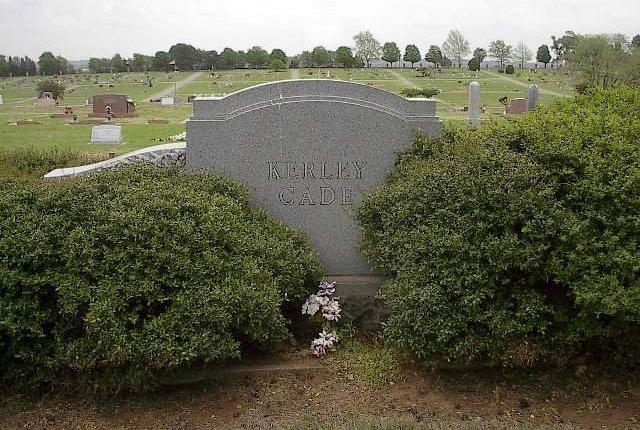
Kerley - Cade Gravestone
Memory Lane Cemetery, Anadarko, Caddo County, Oklahoma.
Photo courtesy of Mel Owings, Caddo County Genealogical Society lookup volunteer.
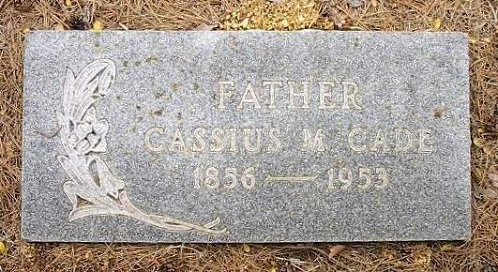
FATHER - Cassius M. Cade, 1856 - 1953.
Memory Lane Cemetery, Anadarko, Caddo County, Oklahoma.
Photo courtesy of Mel Owings, Caddo County Genealogical Society lookup volunteer.
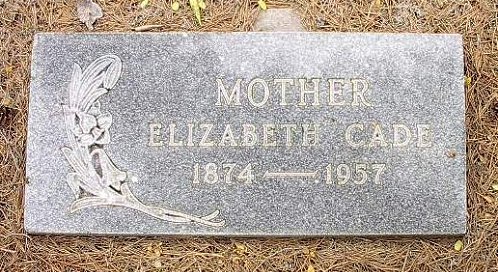
MOTHER - Elizabeth Cade, 1874 - 1957.
Memory Lane Cemetery, Anadarko, Caddo County, Oklahoma.
Photo courtesy of Mel Owings, Caddo County Genealogical Society lookup volunteer.
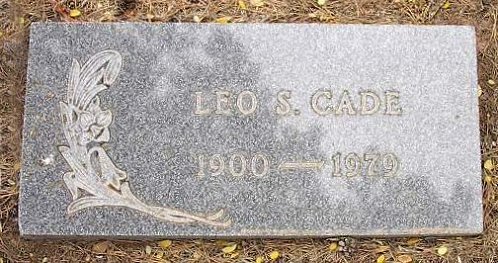
Leo S. Cade, 1900 - 1979.
Memory Lane Cemetery, Anadarko, Caddo County, Oklahoma.
Photo courtesy of Mel Owings, Caddo County Genealogical Society lookup volunteer.
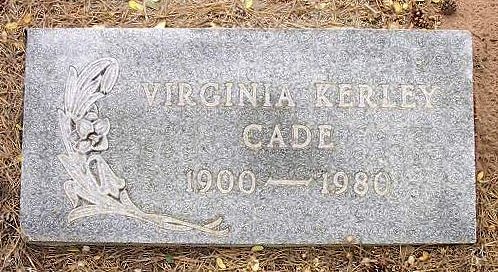
Virginia Kerley Cade, 1900 - 1980.
Memory Lane Cemetery, Anadarko, Caddo County, Oklahoma.
Photo courtesy of Mel Owings, Caddo County Genealogical Society lookup volunteer.
Re: Cash M. Cade of OH, KS & OK - seeking his obituary
Reply from John Cade, 24 May 2005, to Jerry Ferrin in response to a message on the RootsWeb Message Board for Kingfisher County, Oklahoma:
"My great grandfather was 98 when he died in Oklahoma City. The obituary was probably in the Daily Oklahoman. I don't have a copy but if you can find my brother Jere Cade, he will have a copy. The last I knew he was living in Norman, Oklahoma. Sorry I don't have his address.
I would appreciate any info you develop on Cassius Marcellus Cade."
Also see:
S.J. Osborne: A Few Reminiscences of Pioneer Life in Comanche-co.
The Western Star, April 7, 1922Robert C. PALMER
"Cash Cade Tells Of An Old Time Friend", The Western Star, June 19, 1925.
Surnames: Blake, Cade, Doorley, Jennings & Seay.C.M. Cade's Plea for Morgan Wright of Shawnee, Oklahoma, After 18 Years of Imprionment For Murder, circa 1910.
Thanks to Shirley Brier for finding, transcribing and contributing the above news article to this web site!
Copyright © 1996 -
The USGenWeb® Project, KSGenWeb, Comanche County
This page was last updated
11/21/2024